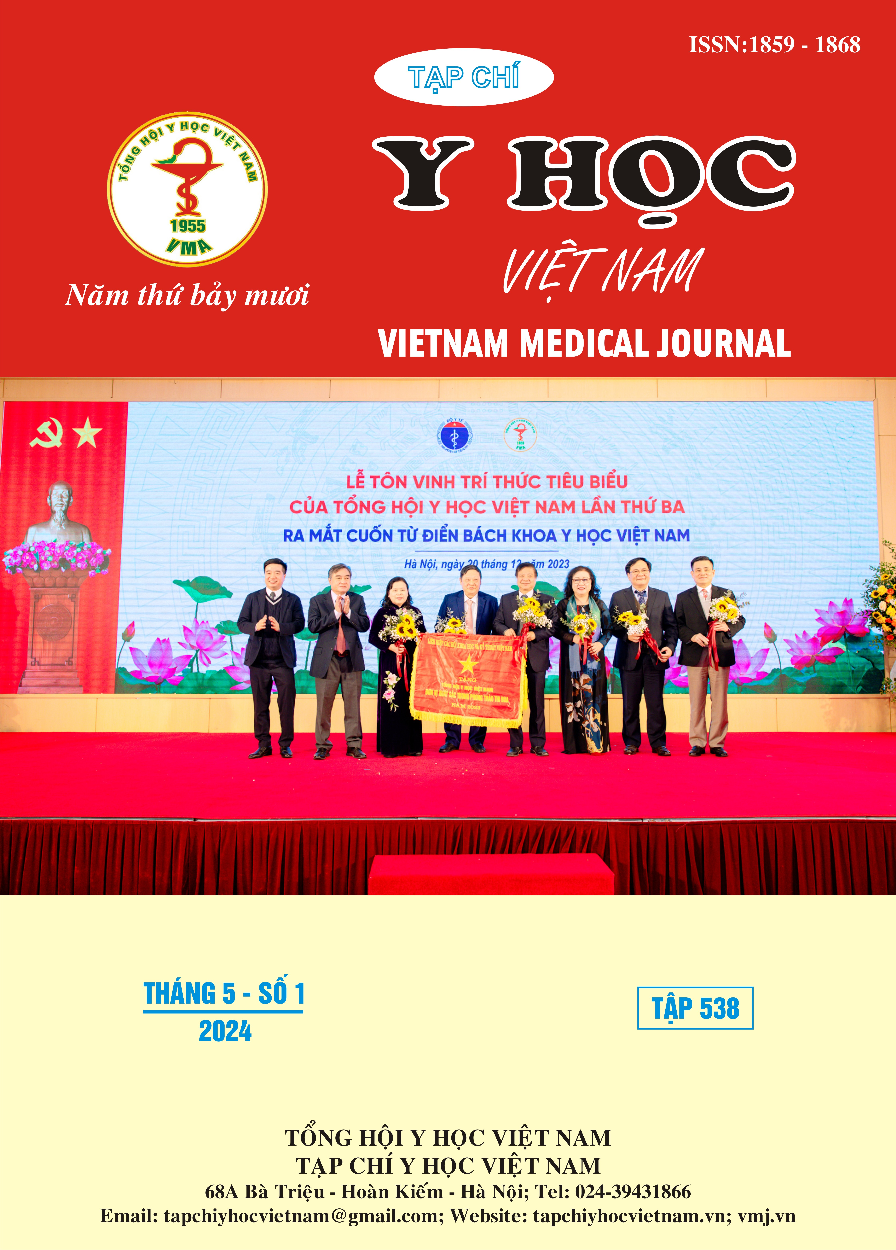EVALUATION OF TREATMENT RESULTS OF GEMCITABIN- CISPLATIN REGIMEN ON PATIENTS WITH UROTHELIAL CANCER AT K HOSPITAL
Main Article Content
Abstract
Objective: To describe some clinical characteristics, subclinical characteristics and treatment results of the gemcitabin-cisplatin regimen on patients with advanced urothelial cancer at K hospital. Patients and research methods: The study describes 32 patients with advanced urothelial cancer who were treated with gemcitabine-cisplatin regimen at K Hospital from 4/2021 to 11/2023. Results: The common age is ≥ 60 years olds, the mean age is 61,25±9,9 years. The proportion of men accounts for 84.4%. The rate of patients with bladder cancer is 50%. The response rate was 62.5%. Median progression-free survival time was 5.6 months (4.9-6.3). Performance status PS=2 was significant adverse prognostic implications to reduce median PFS (P=0,01). Side effects on the hematologic are mainly. The toxicity of the gem-cis regimen was mild and acceptable. The toxicity of the gem-cis regimen was mild and acceptable. Conclusion: Gemcitabine-Cisplatin regimen for treating patients with advanced urothelial cancer has a high response rate. Performance status PS=2 was significant adverse prognostic implications to reduce median PFS (P=0,01). Gem-cis regimen is safe with mild and controllable side effects.
Article Details
Keywords
Urothelial cancer, Gemcitabine- cisplatin.
References
2. Anne BA, Lisa S, Hans Von DM (2008), Gemcitabine and cisplatin in locally advanced and metastatic bladder cancer; 3- or 4-week schedule?, ActaOncologica, 47:1, 110-119.
3. Bray F, Ferlay J, SoerjomataramIet al (2018), Global Cancer Statistics 2018: GLOBOCAN Estimates of Incidence and Mortality Worldwide for 36 Cancers in 185 Countries, CA CANCER J CLIN, 2018;0:3–31.
4. David A. Green (2013). Urothelial Carcinoma of the Bladder and the Upper Tract: Disparate Twins. the journal of urolog. 189 ( 2013), 1214-1221,
5. Dean F. Bajorin và cộng sự (1999). Long-Term Survival in Metastatic Transitional-Cell Carcinoma and Prognostic Factors Predicting Outcome of Therapy. Clin Oncol 17(1999), 3173-3181
6. Dogliotti L, Carten G, SienaSet al (2007), Gemcitabine plus Cisplatin versus Gemcitabine plus Carboplatin as First-Line Chemotherapy in AdvancedTransitional Cell Carcinoma of the Urothelium:Results of a Randomized Phase 2 Trial, European urology ,52 (2007) 134–141
7. Donald Kaufman và cộng sự (2000). Phase II Trial of Gemcitabine Plus Cisplatin in Patients With Metastatic Urothelial Cancer. J Clin Oncol 18 (2000), 1921-1927
8. H. von der Maase và cộng sự (1999). Weekly gemcitabine and cisplatin combination therapy in patients with transitional cell carcinoma of the urothelium: A phase II clinical trial. Annals of Oncology 10: 1461-1465.
9. H. von der Maase và cộng sự (2000). Gemcitabine and Cisplatin Versus Methotrexate, Vinblastine, Doxorubicin, and Cisplatin in Advanced or Metastatic Bladder Cancer: Results of a Large, Randomized, Multinational, Multicenter, Phase III Study. Journal of Clinical Oncology, 17-17 (2000), tr 3068-3077
10. Lorusso V, Manzione L, De Vita F và cộng sự (2015), Gemcitabine plus cisplatin for advanced transitional cell carcinoma of the urinary tract: a phase II multicenter trial, J Urol. 2000 Jul;164(1):53-6.


